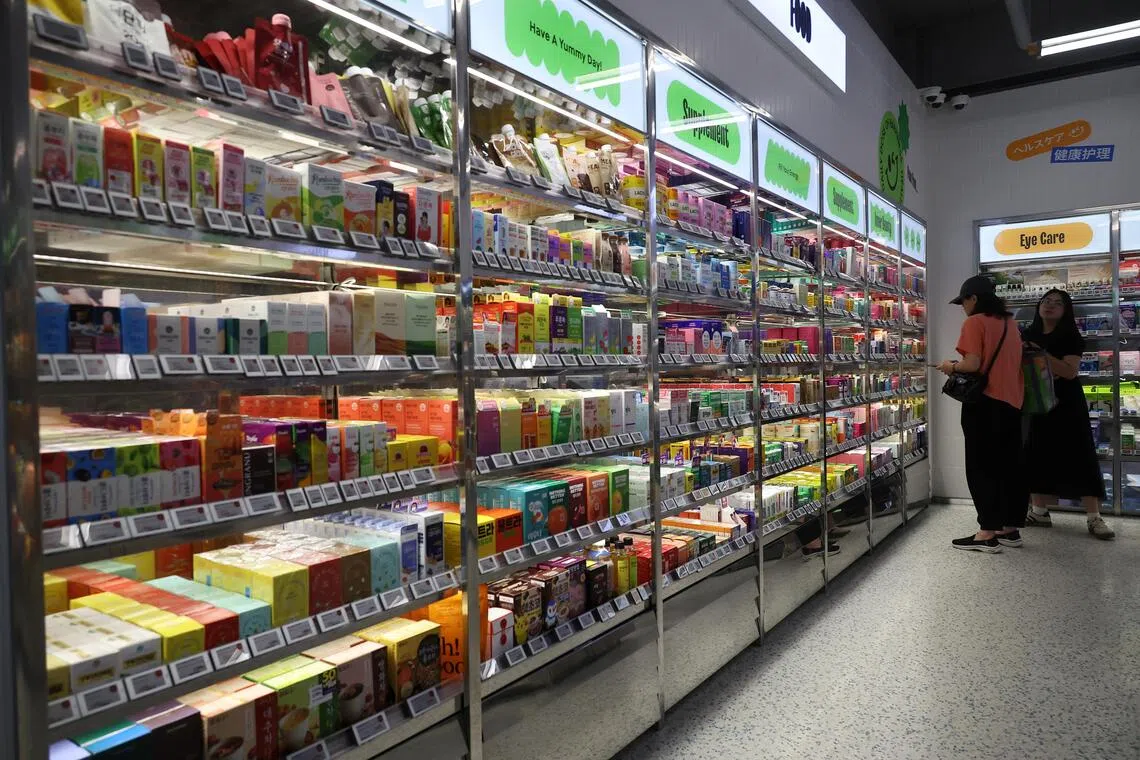China’s new Hallyu: K-fashion struts in as wrinkles pop up in K-beauty
Sign up now: Get insights on Asia's fast-moving developments

At the vanguard is a new generation of Korean contemporary labels, rewriting the style codes at home and abroad.
PHOTO: REUTERS
Follow topic:
SEOUL – The playbook for the Korean Wave in China, once fluent in the lucrative language of beauty, is now turning a new page in fashion.
Korean vogue has emerged as the new cultural currency among China’s style-conscious youth, with apparel exports climbing 45 per cent from US$375 million (S$486 million) in 2020 to US$545 million in 2024, according to the Korea Customs Service.
At the vanguard is a new generation of South Korean contemporary labels, rewriting the style codes at home and abroad with sleek aesthetics and star power amplified through social media.
Among them is Mardi Mercredi, which entered the Chinese market in 2023 and now counts 10 stores through a distribution deal with Mist Holding.
Marithe Francois Girbaud, operated by South Korean fashion firm Layer under an Asia-wide licensing agreement, opened its first Shanghai store in July and plans three more in major cities.
Matin Kim – operated by Hago Haus – is beloved by Gen Z and millennial consumers across Asia for its chic aesthetic. With 11 outlets across Japan, Hong Kong, Taiwan and Macau, it is now poised to enter mainland China.
The brand has seen its annual revenue jump by more than 65 per cent to 128.8 billion won (S$117 million), while operating profit surged 87 per cent from 20.6 billion won to 38.7 billion won.
Its reputation as a guaranteed hit is set to ignite fierce competition among South Korean fashion players vying for exclusive retail rights in China, with contenders including Musinsa, Kolon FnC, E-Land and Misto Holdings. Having already made inroads into China, these retailers view it as too important a market to overlook.
In August, Musinsa established Musinsa China, a joint venture with sportswear giant Anta Group, and plans to open its first Musinsa Standard outlet in Shanghai in December.
“Anta was drawn to Musinsa’s data-driven ecosystem, especially its knack for spotting trends and nurturing small brands,” said one industry insider.
Kolon Sport set up Kolon Sports China with Anta in 2017. Its annual revenue soared sevenfold from 70.3 billion won in 2021 to 503.2 billion won in 2024.
“Chinese consumers have come to see K-fashion in a new light, thanks to savvy marketing and the growing sway of Korean culture,” said one industry official. Lessons from K-beauty’s setbacks have helped brands calibrate local strategies.
Data from the Ministry of Food and Drug Safety shows that K-beauty’s sparkle in China has begun to fade, even as South Korea’s cosmetics exports hit a record US$8.5 billion in the first three quarters.
China has ceded its long-held top spot to the United States
Industry giants have taken note and are pivoting towards markets like North America and Europe after years of China-fuelled expansion.
Amorepacific has shuttered all physical stores for its brands Innisfree, Etude and Laneige in China to focus on e-commerce.
LG Household & Health Care, once buoyed by Chinese demand for its luxury lines, posted its first quarterly loss in two decades in the second quarter.
The K-beauty slump appears to stem from a cocktail of factors: the lingering shadow of China’s informal ban on South Korean cultural content following Seoul’s deployment of the US Terminal High Altitude Area Defence missile system in 2017, the meteoric rise of Chinese beauty rivals and a cooling consumer sentiment in China.
“Although K-beauty’s strength lies in its product quality, mounting competition and the spread of counterfeit products in recent years have posed serious threats to its competitiveness,” one industry expert noted. THE KOREA HERALD/ASIA NEWS NETWORK

